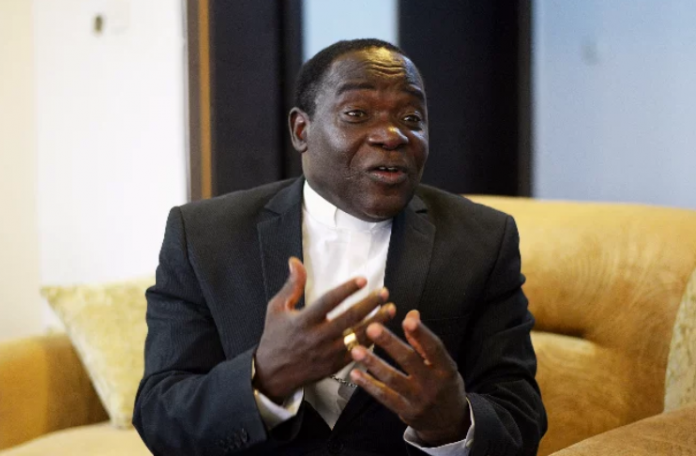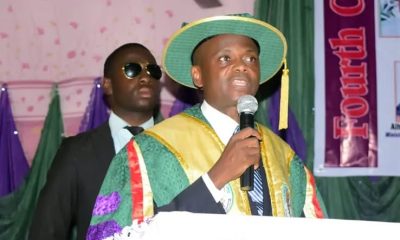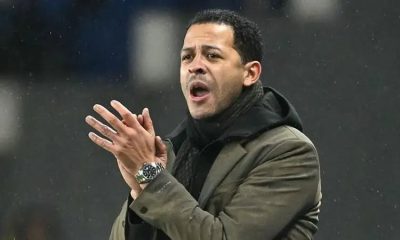Featured
Full text of Bishop Kukah meeting with US Congress
Published
5 years agoon
By
Editor
The presidency has launched a full-on attack on Catholic Bishop Matthew Hassan Kukah, a regular critic of the administration, for some of the points he raised in his virtual meting with the US Congress last week.
The President Muhammadu Buhari government particularly objected to the point about Muslims populating the administration.
Below is the full transcript of the conversation.
Thank you very much Congressman Smith. Thank you for your coach too for this very kind invitation. You know I was in your office some four or five years ago in company of Aid to a church in need and you have actually made my job very easy because your presentation and your reference to Nigeria was most eloquent and I really want to thank you for paying attention to our situation.
I think a lot things have come to ahead in the last ten or more years—Boko Haram and so on. I think it is important to note that this has been a slow burning candle. It only just escalated.
Since Independence, the while question for religious freedom for minorities in northern Nigeria has been an issue of very serious concern. In fact because of the nature of the history of the country itself and the fact that the British conquered the Sokoto Caliphate.
And then as now, the feeling among the predominant segment of the Muslim population has been a need to insert or assert the supremacy of Islamic law and for many cases even in the course of our Constitutional debate, the belief that what the Holy Quran dictates is superior to the provisions of the Nigerian Constitution.
That also you know has the larger effect on Christians has been the fact that until now, the issues of access to places of worship, the fact that you know Muslim militants have absolutely no qualms about the destruction of Christian churches at the slightest provocation even when a lot of the issues have no direct bearing with the situations in Nigeria.
The killing of Osama bin laden for example, a significant part of the Muslim extremists reacted to that by venting out their anger on the destruction of churches and so on
We have lived through with this but I think that events in the Northeast with the coming of Boko Haram simply has raised the stake. A lot of the information is pretty well known and I don’t think it needs repeating and you have made the point in your own reference to Nigeria—namely the consistent and the persistent destruction of church properties.
As you know, almost from the beginning of time so to say, from the emergence of the modern state across the world, the Catholic Church has been at the forefront of the progression of social services, education, health services and so indeed hike many other institutions, we are at the lowest level of society so we feel the pulse of our people.
A significant percentage of Senior Muslims in Nigeria and non-christians and non-catholics are beneficiaries of Catholic education. You know this assault and attack on our physical infrastructure has come to us with you know a lot of shock but it’s been like you said very clearly, we have to place this in the context of the emergence and the global ambitions of salafist Islam and more or less what that has brought to us.
“In the last 10 or so years, we have witnessed things we never dreamt about before that is the mindless targeting, slaughtering and kidnapping of church personnel in 2018 and for example and this is not the first I’m two of our priests and 17 of their parishioners were slaughtered during the morning mass and you know a lot of the killings there’s absolutely no relationship between the atrocities themselves and the activities of ordinary people.
Before now, one or two or three of our priests had been killed in the moment of crisis. Last year the bandits invaded our seminary and kidnapped four of our seminarians and I’m sure almost every I mean the killing of Michael, the seminarian from my diocese in Sokoto gained quite a lot of global attention. You know what is also very significant for us as Christians is that one day, policemen drove into seminary and they came with a few people they had in their vehicle that they had actually captured the people who killed Michael and what was very significant for us was that Michael was supposed to have been killed on grounds that he was just an 18 year old kid but his kidnappers ‘look we were shocked that this young man was standing before us and calling on us to repent despite knowing that we were Muslims and despite seeing our guns and so on so I made this point in passing to make a case that it’s not as if Christians have been sitting down.
Occasionally, many of our people have seen this as an opportunity to also bear witness. We have had a lot of other killings as I said to know and there’s probably no need for me to go into details but a lot of our young Christians who have been kidnapped, some of them have been forcefully asked to convert Islam, some have been turned into spies, cooks and sexual slaves—the story of Leah Sharibu suggests very clearly you know that there is many instances a correlation between in which people find themselves in and the faith that they believe in.
But very quickly what has been the reaction of the church and I speak here specifically on behalf of the Catholic Church. We have always done what we have done namely to take very seriously Jesus’ instructions that he has come that we may have life and have it to the full and we continue to work relentlessly. We issue statements. We call government’s attention to the realities of the situation. We have also tried to reach out to let government understand our willingness and commitment to work towards the greatness of our country.
What is significant about the situation in Nigeria is that we are in a democracy albeit very weak you know with all the weak structures, inefficiencies, deficiencies, it is not as if, we are struggling to overthrow a dictatorship but that we have a situation which some autocrat in power and we need to get him out of the way so we can establish a democracy is that these things are happening in a democracy.
I think what is also significant and worthy of note is that things have just unravelled in the last five or six years since the coming to power of General Buhari. He didn’t make Boko Haram happen but the fact that today the Northwest and North Central and literally the length and breadth of Nigeria have now been invaded by bandits, herdsmen and killers of all kinds of people who have come from God knows where and the fact that the government just seems to be either helpless or almost uninterested in dealing decisively with these people.
This is what has added more confusion to the mix and the contradiction here is that the President had blatantly pursued rather nepotistic but also policies that show very clearly preferences for men and women of his faith. The entire security outfit now is in the hands of Muslims. The Chief Justice of Nigeria who was a Christian was replaced under very dubious circumstances.
In the National Assembly, it was always the case of Christian as Senate President and Muslim as Speaker or whatever the case but for the first time in history of our country literally every outlet it’s more or less been blocked because the Senate President is a Muslim, the Speaker of the House is a Muslim, the deputy Speaker is a Muslim, the majority leader is a Muslim and these are all fine gentlemen but that is not the point.
The point is that the level of anxiety amongst us as Christians and Muslims have exacerbated and of course the tragedy behind in all of this is that it is not as if Muslims are having a better deal because more Muslims have been killed as a result of the crisis that we are in than other Christians but again unfortunately this is not the way we should be looking at this when thing and what the Bishop conference have also tried to push for is the need for has to focus on our common humanity so my way of trying to end just to make the point that first of all our Justice and peace commissions and characters are doing fantastic work in our area of rehabilitation and helping our people to rebuild their lives and some of the challenges and of course more than you know they are beyond what we can deal with or on a practical level I think that the problems, we have are existential problems.
People are dying and they are dying literally by the day they are being killed and being slaughtered in their sleep and the question as to how we will rebuild our country and what is going to happen—these are the challenges and I give you a very practical example here and I don’t know whether I should say this but I think I should. The government of Hungary for example has intervened in a way and manner that fits the type of thing we are talking about that is beyond sanctions, we need concrete actionable Initiatives that change the lives of people.
For example, my diocese in Sokoto which is made up of Sokoto, Kebbi, Zamfara and Katsina, with the help of the government of Hungary, we have been able to rebuild our schools, our people’s lives are changing, we are building a health facility in Sokoto, a diagnostic centre with the help of the Hungarian government.
So I would like to appeal to the US government to do two things. One, while talking to the Federal Government at a diplomatic level, it is important that government agencies like USAID and others begin very concrete conversation with the various church organisations so that we can get our children back to school because the only way we can fight Boko Haram is through education.
Right now, we are dealing with the widows, orphans and children. In Northern Nigeria alone, there are fifteen, sixteen million who are on the street. 80 or 90 percent of them are Muslim children so it will not be possible for us to close this gap without as if we go it the next phase with such a huge percentage of illiterate people. Our problem can only get more complicated.
I really want to thank you for continuing with this engagement but also just to conclude by saying the Nigerian situation is not a helpless situation because a lot of educated people in Nigeria are Christians and the date of the Christian minorities in Northern Nigeria and of course even Muslim minorities elsewhere these are the issues but I like to focus on the fact that we require practical, measurable forms of assistance that can help to change the lives of our children whether it is through scholarships or whether it is through rebuilding of schools and so on and so forth—something that church has done and continues to do very well.
Once again, thank you very much for your kind attention and privilege.
Trending

 Latest2 days ago
Latest2 days agoYoruba film industry mourns as popular actress aunty Ajara passes away

 Trends3 days ago
Trends3 days agoTonto Dikeh reunites son with Churchill after decade-long split

 Energy1 week ago
Energy1 week agoNNPC unveils gas master plan to boost Nigeria’s energy sector

 Education1 week ago
Education1 week agoAchievers University expels 15 female students over indiscipline

 Business5 days ago
Business5 days agoRite Foods positions industry as catalyst for Nigeria’s clean energy transition

 Football5 days ago
Football5 days agoArsenal’s Osman Kamara completes permanent move to Blackburn Rovers

 Health5 days ago
Health5 days agoControversial preprint revives vaccine–autism debate, draws sharp pushback from medical experts

 Featured1 week ago
Featured1 week agoEPL: Palmer fit for Chelsea’s match against West Ham – Rosenior

